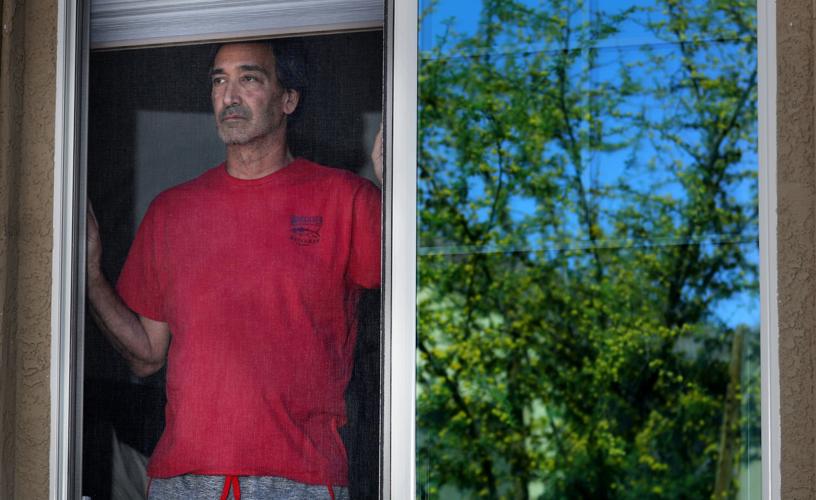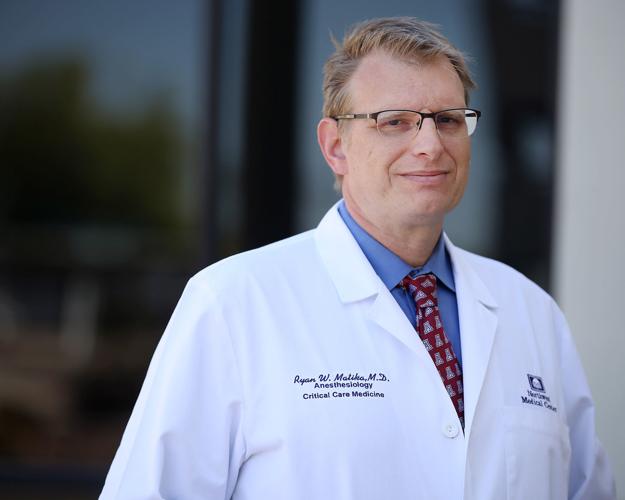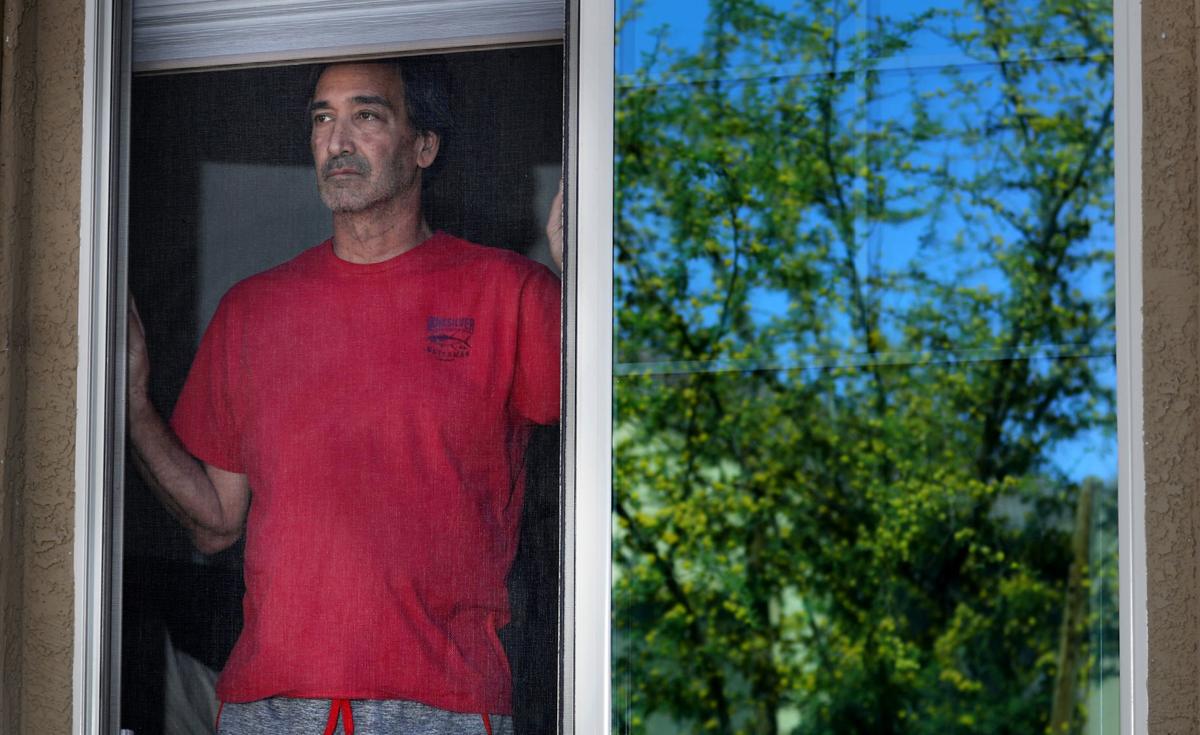Glen Reed was admitted to the hospital with COVID-19 on March 11. When his doctors told him he would have to be intubated, he and his family didn’t know if he would ever wake up.
“At that point, I thought there’s so much I didn’t do,” he said. “I have a grandson who’s just turning 6 and I’m thinking ‘God, what’s happening here?’ I’m not done yet. I’m not ready.”
After three weeks in intensive care and over two weeks on a ventilator, the 57-year-old was discharged from Northwest Medical Center on April 7. He is now negative for COVID-19.
Reed described the last month as the most difficult experience of his life. After developing shortness of breath and a fever around March 6, Reed’s wife finally persuaded him to go to the emergency room.
Because of testing constraints at that time, the hospital didn’t get his positive test result until March 15. Reed’s doctors knew he was at a higher risk for developing more severe symptoms because of his previously diagnosed hypertension.
“We were treating him with the assumption of this disease and not necessarily knowing that he had it,” said Dr. Ryan Matika, the hospital’s director of critical care and the physician in charge of Reed’s case. “When I reviewed his X-rays and CT scans and labs, it looked like it, it smelled like and it felt like it, so we just pulled the trigger and said this is what it is, and we’re going to go all in.”
During his first five days in the hospital, Reed’s breathing continued to get worse. The doctors wanted to be as aggressive with his treatment as possible, so they decided it would be best to place him on a ventilator.
Because he couldn’t have any visitors in isolation, Reed said goodbye to his wife and three kids through a video chat.
“I didn’t know whether he was going to survive,” said his wife, Beverly Reed. “It was pretty dire at that time. He was maxed out on everything, on all the medications they could give him. So I got down on my hands and cried out to God. I called friends and asked for them to pray for him.”
Beverly said she was on the phone with Reed’s doctor and nurse every day while he was on the ventilator. Unfortunately, as her worry for her husband grew, Beverly also started to develop coronavirus symptoms. She tested positive for COVID-19 on March 23.
“I ran fevers for the first week, and it was awful,” she said. “It takes everything you have to eat and drink. You can’t even taste the food. It tastes like nothing and then you throw up all the time because you deal with all the nasty mucus that goes in your stomach and it’s just awful.”
While Beverly did have to go to the emergency room one time, she said she did everything she could to fight the virus at home.
Meanwhile, on March 31, Reed’s doctors made the decision to remove him from the ventilator after 15 days.
“We know that a lot of patients with this disease come off the ventilator, and then they have to go back on. So we were a little bit extra careful, took our time, made sure that everything looked good,” Dr. Matika said. “When we extubated him, we felt really, really good about him staying off the ventilator. And fortunately, he continued to do nothing but improve.”
At this point, Reed’s doctors performed two additional COVID-19 tests, at least 24 hours apart, and both came back negative. Reed said he had no idea how he originally contracted the virus.
Now at home, Reed and Beverly say they are taking things day by day. While Beverly’s symptoms have passed, Reed is still recovering from his long stint in the hospital.
Not being able to eat solid food for such a long time, Reed lost 40 pounds and quite a bit of muscle. Since being discharged, he’s been relearning to walk and will start physical therapy next week.
The virus has also caused Reed to lose his sense of taste, so eating has been a struggle for him. He’s been closely monitoring his blood pressure since he’s been home.
What kept him going through it all, he said, was family and faith. He’s hoping that people will take the virus seriously and do what they can to help prevent the spread.
“Obviously everybody’s gonna have symptoms and severity different than me. But I did come out on the other side and I’m still here,” he said. “Don’t lose your faith in whatever you’ve chosen to believe in. Don’t lose your faith, keep your faith grounded. For me, that’s kind of what got me through this and what is still getting me through it.”
Since returning home from the hospital, Beverly said Reed has also struggled with a sense of guilt.
“He doesn’t understand why he lived and other people didn’t,” she said. “It was heartbreaking seeing him go through that in his mind. I’m sure other people who are going through this have this same guilt, but all I can say is that they just need to thank God, love their families and love others.”
Even with these challenges, the couple said the support and love that they’ve seen from their family, friends and community members has been overwhelming. Reed said he is especially grateful for the health-care workers who cared for him at Northwest hospital.
“I have such a newfound respect for the techs, nurses, doctors and everyone who has worked on me this past month. They have the toughest job in the world right now. They have to risk their lives to save somebody who’s so sick that they may die,” he said. “The entire staff at Northwest, they are just absolutely great. I can’t say enough thank-yous to that entire staff for what they did for me.”
Reed was Northwest’s first COVID-19 patient but certainly not the last. The hospital staff said it is continuing to learn new information about the virus and is as prepared as it can be to take on these cases.
“I think that what we want our community members to know is that health care has shifted from the first line of defense to the last line of defense,” said Northwest Medical Center CEO Jennifer Schomburg. “The community has to be the first line of defense, as far as being home practicing social distancing, focusing on washing their hands. Just being in general, I think, a good community member is what we need people to be focused on first and foremost.”
Photos for April 11: Tucson gets by during Coronavirus Pandemic
Tucson in photos, coronavirus pandemic
Updated
Susan Hillman chats with her mother Betty Hillman via telephone, April 9, 2020, Tucson, Ariz. Eighty-five year old Betty Hillman is in long term skilled care and Susan is unable to visit due to COVID-19 restrictions on nursing home facilities.
Tucson in photos, coronavirus pandemic
Updated
Susan Hillman chats with her mother Betty Hillman near a photo of Betty and her husband, Susan's dad, Bill, circa 2105, April 9, 2020, Tucson, Ariz. Eighty-five year old Betty Hillman is in long term skilled care and Susan is unable to visit due to COVID-19 restrictions on nursing home facilities.
Tucson in photos, coronavirus pandemic
Updated
Ben Forbes, left, owner of Forbes Meat Company, helps Jeronimo "Mo" Madril, right owner and executive chef of Geronimo's Revenge, wrap up tortilla's for to-go carnitas for Forbes Meat Company and Geronimo's Revenge's "Carnitas for the community" at Thunder Canyon Brewery, 220 E. Broadway Blvd., in Tucson, Ariz., on April 6, 2020. Forbes Meat Company and Geronimo's Revenge partnered to help the restaurant community by offering free carnitas to those affected by the Coronavirus Disease (COVID-19). They will be making to go carnitas every Monday in April starting at 2pm until all the to go packs, roughly 60, are all gone. Forbes wanted to find a way to help out the restaurant community. "They are struggling and my business is exploding," said Forbes.
Tucson in photos, coronavirus pandemic
Updated
David Clark, left, out of work bartender, and Jeronimo "Mo" Madril, owner and executive chef of Geronimo's Revenge, practice social distancing while waiting to give out carnitas for Forbes Meat Company and Geronimo's Revenge's "Carnitas for the community" at Thunder Canyon Brewery, 220 E. Broadway Blvd., in Tucson, Ariz., on April 6, 2020. Forbes Meat Company and Geronimo's Revenge partnered to help the restaurant community by offering free carnitas to those affected by the Coronavirus Disease (COVID-19). They will be making to go carnitas every Monday in April starting at 2pm until all the to go packs, roughly 60, are all gone.
Tucson in photos, coronavirus pandemic
Updated
Steve Tracy, Thunder Canyon Brewery co-owner and brewer, fills up 16oz bottles of locally made hand sanitizer at Thunder Canyon Brewery, 220 E. Broadway Blvd., in Tucson, Ariz., on April 6, 2020. Thunder Canyon Brewery, along with a few other local distilleries, are making United States Food and Drug Administration approved hand sanitizer for hospitals, first responders and the public in response to Coronavirus Disease (COVID-19). "Whatever I have, I am turning into hand sanitizer," said Tracy. "We are going to keep making it as much as we can."
Tucson in photos, coronavirus pandemic
Updated
Steve Tracy, Thunder Canyon Brewery co-owner and brewer, fills up 16oz bottles of locally made hand sanitizer at Thunder Canyon Brewery, 220 E. Broadway Blvd., in Tucson, Ariz., on April 6, 2020. Thunder Canyon Brewery, along with a few other local distilleries, are making United States Food and Drug Administration approved hand sanitizer for hospitals, first responders and the public in response to Coronavirus Disease (COVID-19). "Whatever I have, I am turning into hand sanitizer," said Tracy. "We are going to keep making it as much as we can."
Tucson in photos, coronavirus pandemic
Updated
David Sbarra, a psychology professor at the University of Arizona, points his webcam at his children Margot, 9, and Mateo, 12, as he begins his introduction of his office hours for a class he now conducts over Zoom in his living room while teaching from home, on April 7, 2020.
Tucson in photos, coronavirus pandemic
Updated
Ben Elias, manager at Westbound, center, helps Dustin Schaber with his pickup order on April 8, 2020. Due to the coronavirus disease (COVID-19) only two customers are allowed in the shop, located at the MSA Annex, at the same time and all orders are to-go.
Tucson in photos, coronavirus pandemic
Updated
Laura Tanzer, a local fashion designer, posted on Facebook that she will make masks for $5.00 each on April 5. Tanzer thought she would receive a couple of dozen orders, but, within 24 hours she heard from over 200 people. Tanzer is now working out of her shop in downtown Tucson making masks that also has a filter sowed into them. Tanzer is wearing one of her masks as she sows on April 8, 2020.
Tucson in photos, coronavirus pandemic
Updated
Oro Valley Hospital chief administration officer Erinn Oller talks with Fang, a local organizer with the Chinese-American COVID-19 Relief AZ group, which donated 6,000 masks, on April 9, 2020. Additional mask donations are planned as soon as shipments arrive.
Tucson in photos, coronavirus pandemic
Updated
Healthcare workers line up for their 2 free Sonoran hot dogs and a drink from BK Carne Asada & Hot Dogs in the parking lot of St. Mary's Hospital on April 10, 2020. The owner, Benny Galaz, is giving free food to healthcare workers at Tucson area hospitals for the next several weeks as a way to say thank you for their hard work during the coronavirus disease (COVID-19) outbreak.
Tucson in photos, coronavirus pandemic
Updated
Benny Galaz, owner of BK Carne Asada & Hot Dogs, cooks up Sonoran hot dogs in the parking lot of St. Mary's Hospital on April 10, 2020. Galaz is giving free food to healthcare workers at Tucson area hospitals for the next several weeks as a way to say thank you for their hard work during the coronavirus disease (COVID-19) outbreak.
Tucson in photos, coronavirus pandemic
Updated
Healthcare workers line up for their 2 free Sonoran hot dogs and a drink from BK Carne Asada & Hot Dogs in the parking lot of St. Mary's Hospital on April 10, 2020. The owner, Benny Galaz, is giving free food to healthcare workers at Tucson area hospitals for the next several weeks as a way to say thank you for their hard work during the coronavirus disease (COVID-19) outbreak.
Tucson in photos, coronavirus pandemic
Updated
A man uses the taped off exercise station in Reid Park as an anchor for his band workout, April 8, 2020, Tucson, Ariz.
Tucson in photos, coronavirus pandemic
Updated
Alicia Roseanna, 9, fourth grader at Esperanza Elementary School, grabs a sheet of paper while listening to her teacher, Rachel Watson, and her classmates inside her home in Tucson, Ariz. during Watson's online class on April 7, 2020. Due to the Coronavirus Disease (COVID-19) closing down schools and universities, teachers and students have been forced to schedule and participate in classes online for the remainder of the school year.
Tucson in photos, coronavirus pandemic
Updated
COVID-19 survivor, Glen Reed, poses for a photo looking out from the room he's using for isolation from his family in his home, April 10, 2020, Tucson, Ariz. Reed spent nearly a month in the hospital including weeks in ICU on a ventilator.
Tucson in photos, coronavirus pandemic
Updated
ER and EMS workers run through a drill practicing how to process an incoming patient experiencing a respiratory emergency at the Tucson Medical Center's Emergency Room, on April 10, 2020.
Tucson in photos, coronavirus pandemic
Updated
Tucson Fire Paramedic personnel prepare to run a drill at the Tucson Medical Center's Emergency Room, on April 10, 2020.
Tucson in photos, coronavirus pandemic
Updated
The CDC recommends Americans wear a facial covering when out in public, part of an effort to reduce the spread of the virus that causes COVID-19. Above, shopping for spring blooms at Tucson’s Green Things Nursery.
Tucson in photos, coronavirus pandemic
Updated
Coronavirus disease (COVID-19) signs taped onto dorms at the Babcock Dorms. The rooms located at 1717 E Speedway Boulevard may be used to house hospital workers from Banner - University Medical Center if they need to be quarantined due to COVID-19.
Tucson in photos, coronavirus pandemic
Updated
Alex Swain, a member of Beloved in the Desert - Tucson's chapter of the Episcopal Service Corps, packs the trunk of his housemate's SUV in the parking lot of Fry's on 2480 N Swan Road after grocery shopping for an elderly man, on April 3, 2020. Swain and his housemates have volunteered to shop for elderly and at risk populations as people quarantine and stay at home during the Coronavirus (COVID-19) pandemic.
Tucson in photos, coronavirus pandemic
Updated
Julisa Montano, a bus driver with Sunnyside Unified School District, gathers up the last few meals to hand out to students outside of Gallego Primary School, on April 7, 2020. The school district is distributing meals and has wifi available for students to use for school.
Tucson in photos, coronavirus pandemic
Updated
A table is taped off at Fred Enke Golf Course, 8251 E. Irvington Rd., in Tucson, Ariz., on April 5, 2020 due to Coronavirus Disease (COVID-19). With a rise in the amount of people participating in golf, due to Coronavirus Disease (COVID-19), Tucson City Golf is taking extra measures to keep people safe such as sanitizing golf carts after each use and social distancing.
Tucson in photos, coronavirus pandemic
Updated
Rich DelVecchio, a Fred Enke Golf Course employee, sanitizes a golf cart. Course revenues at Tucson’s city-owned golf properties are up nearly 28% from the same period last year.
Tucson in photos, coronavirus pandemic
Updated
Golfers practice social distancing while on the driving range at Fred Enke Golf Course, 8251 E. Irvington Rd., in Tucson, Ariz., on April 5, 2020. With a rise in the amount of people participating in golf, due to Coronavirus Disease (COVID-19), Tucson City Golf is taking extra measures to keep people safe such as sanitizing golf carts after each use and social distancing.







